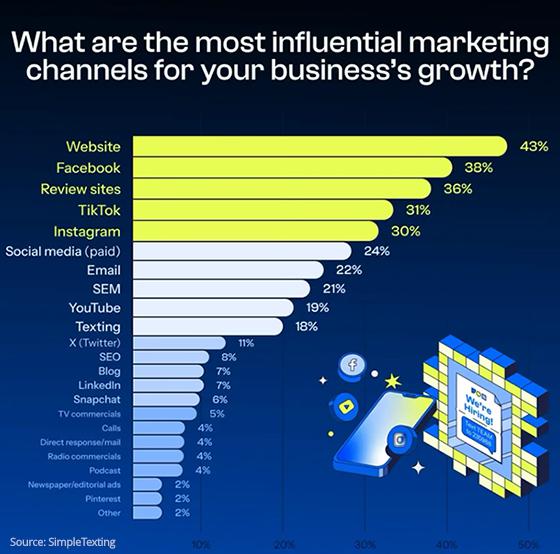
Consumers and small businesses are at odds over how marketing
should be done, judging by The state of small business marketing in 2024, a two-part study by SimpleTexting.
Of the consumers polled, 38% prefer receiving marketing
communications from SMBs via email, while 34% cite social media as their preferred channel.
Of course, the devotion to email varies with age. Boomers are most likely to prefer
email, with Gen X close behind them. But Gen Z favors social media by a wide margin, followed by millennials.
Gen Z also likes text messages, while Boomers do not. But Boomers are open to
direct mail by a wide margin over other groups, although direct mail and direct response are used by only 4% of small businesses.
In contrast to customer preferences,
SMBs list these channels as the most influential for their business growth:
- Website — 43%
- Facebook — 38%
- Review sites — 36%
- TikTok — 31%
- Instagram — 30%
- Social media (paid) — 24%
- Email — 22%
- SEM — 21%
- YouTube — 19%
- Texting —
13%73
- X (Twitter) — 11%
advertisement
advertisement
Whatever the channel, consumers can expect to see more marketing over the next year,
for 63% of small businesses expect to increase their marketing budget, the most likely sectors being technology (80%), human resources (80%), and finance (76%).
Yet budget
is by far the biggest marketing hurdle faced by small businesses:
Limited budget — 52%
Time constraints — 34%
Finding the right marketing channels —
28%
Keeping up with tech and trends — 27%
Measuring what works — 26%
Lack of marketing expertise/ideas
— 23%
Finding and retaining a strong team — 20%
Creating marketing — 19%
Measuring marketing ROI — 11%
Other — 0.8%
AI is another question: 59% of small firms are now incorporating AI into their marketing strategies. But 73% of consumers say use of AI by a business does NOT make them
more likely to shop there.
However, they say they would be inclined to do so if the business was using AI technology to:
Streamline checkout process and bolster security —
39%
To personalize my shopping experience — 33%
Schedule appointments/reservations through AI — 38%
Enhance product recommendations —
27%
Optimize inventory management and delivery — 27%
Improved customer service via chatbots — 21%
Analyzing customer feedback through AI — 11%
Here
are the potential downsides of AI — to consumers:
- Privacy concerns and how my data is used by AI — 47%
- If prices of the products/services
increase with AI — 45%
- AI replaces human jobs within the small business — 44%
- Less personal interaction with the business —
42%
- AI-generated responses feel generic and not tailored to my needs — 42%
- Negative past experiences with AI
in customer service — 25%
SimpleTexting surveyed 1,000 U.S. consumers and 400 U.S. small business owners and marketing managers from March 12-14,
2024.
A blog reporting on the full study can be found here.